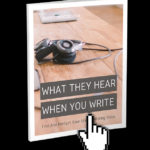I always watch the Super Bowl with a notebook in hand.
The pregame show, the interviews, and yes, of course the commercials… are a masterclass in storytelling. In fact, one of my first blog posts at On Life and Writing was about a Super Bowl ad.
And while Tom Brady and the Patriots have created a dynasty on the field, they have failed miserably over the years at storytelling.
(Just check out this map that shows unless you live in New England, you likely were thrilled with the outcome last night.)
So let’s talk about what we can learn as copywriters from the Super Bowl.
Super Bowl Copy Lesson #1: Nobody roots for the Empire
The Eagles and the Patriots had very different brand stories going into the game.
The Eagles were the blue-collar underdog. The city that needs a win.
The Patriots were the dynasty. The favored ones. And Tom Brady their Golden Boy. The record holder in just about every Super Bowl QB stat.
And Belichick and Brady perpetuated that story. What’s Belichick’s secret to success? Work hard, be the boss, and never look back.
Brady has a similar philosophy. That he sells for $200.
Success on its own is terrible for branding.
Think about the following people:
- Trust-fund billionaires who used Daddy’s money to create a successful company
- The chain store that forced out the mom and pop shop
- The Empire that rules the galaxy nearly unopposed
These are all successful people, but we don’t like them. We like to see a struggle. We like drama.
And the thing is, if you know about Tom Brady and Bill Belichick, they have incredible backstories.
Belichick was the most hated man in Cleveland during his coaching tenure there. And Tom Brady was a nobody backup quarterback at Michigan who had to see a sports psychologist to help him deal with his anxiety and frustration at being 7th on the depth chart before he became successful. Drafted in the 6th round, he was hardly recognized as the next big star.
(For more, I highly recommend The Education of a Coach as a lesson on overcoming odds and becoming a leader).
But the Brady/Belichick philosophy of “never look back” means that these stories aren’t shared anymore. They are winners and that’s all anyone needs to know.
Contrast that to the Eagles who are more like the “Sandlot” or “The Big Green” or [INSERT YOUR FAVORITE SPORTS MOVIE HERE]. They are the guys that aren’t supposed to win. The Rebel Force fighting the Empire. And that makes them very easy to like.
So what does that mean for you?
Success is good. But, telling your success story without the struggle can make you unlikeable. How did you get where you are? What did you have to overcome? Share those in your copy. Always be the rebels. Never the Empire.
Super Bowl Copy Lesson #2: To be memorable, call out the naked emperor
Alright, it’s time for the fun stuff. The commercials.
Great commercials have staying power. They stick way down in your brain and never leave.
That was even the theory behind Sesame Street. Founder Joan Ganz Cooney thought that if 3- and 4-year-olds were singing beer jingles, then TV could also be a force for good.
And this year, one ad took this to the next level.
Did you guess?
“It’s a Tide Ad”
Tides 4 spots meant that we were actively looking for Tide ads. Every commercial had the potential to be Tide in disguise. And it made that “other” detergent commercial seem silly and bland. So much so that many of us were waiting for Tide to take it over.
Tide called out the emperor’s clothes, quite literally. Every ad had clean clothes. And Super Bowl ads are insanely predictable. My personal favorite was the use of the Clydesdale.
What does this mean for you?
Calling out a trope in your industry can be an insanely effective way to stay top of mind. Every time one of your potential clients sees these tropes, they’ll think of you. Here’s a few people who have done this with success:
Super Bowl Copy Lesson #3: In today’s world, you need to take a stand
Next week, I’ll be speaking at The Copywriter Club event. In addition to a talk about voice, I’ll be on a panel with 5 other writers about IMPACT.
People expect more from the companies they interact with. They want to do business with companies that focus on ways to make the world better — not just ways to make more money.
This was probably the biggest thread throughout the Superbowl this year.
Stella Artois, Hyundai, Verizon, and Toyota all had “giving back” themed-ads.
Plus, one from Budweiser that gave away the best-kept disaster responder secret:
It always felt like a bit of an “in club” to know that those Budweiser water cans existed. I’d partaken in them many times through my work with Team Rubicon. Seeing the ad made me wonder how many times that one guy in the ad department had pitched it over the years.
What does this mean for you?
Like I said in the beginning of the article, it’s not enough to be successful. It’s what you do with that success that matters. People like working with people that do good. So what can you do to make an impact? And how can you share that with the world.
Now from you…
I’d love to hear your take on the Super Bowl this year. What stood out to you?


I think your lack of football knowledge isn’t a great excuse to be yet another person who loves to hate the Patriots. If you ever had watched ESPN you would have seen the story of Brady not getting picked in the draft 100 times. I’m not from New England – I’m from California, and I know where Brady played in high school and how far he came. I would say your greater lesson here is not being another person to perpetuate a myth that doesn’t actually exist. Nobody loves an empire? How do you explain the current moron in the White House then? No the truth is that everyone loves to feel better about themselves. If it makes you feel like a big man to dump on the winning team, that is what you do. If someone wants to tell you what you want to hear, even if it’s not true, that is what you listen to. So if you want to write a struggle story, write it because you’re trying to convince your audience to follow on the same path you went on, because you can help them follow that path just as you did. I’m a web developer, no one wants to know my struggles – they just want me to have all the answers. I’m just tired of everyone bagging on a team that they don’t understand. They want to be Tom Brady but they don’t want to give up ice cream, go on strict diets, and hire a personal trainer 365 days a year. Let’s stop the myth that hard work makes you a bad person.
Hey Nikole! Thanks for your comments. I’m not anti-Patriots or pro-Eagles. I’m a Bills fan which is a whole other level of masochism!
I find copywriting lessons everywhere and my background as a sports journalist makes these stories stick out even more to me. Next week, in the Olympics you’ll see the “struggling backstory” of literally hundreds of athletes shown.
I find it fascinating to look at the stories each team is portraying. For example, today (a day after this post went live), there’s a viral clip of Nick Foles talking about failure: https://www.youtube.com/watch?v=PZeAcWhCrls
That’s right in line with the brand that the Eagles have created this year.
Backstory and vulnerability is one of the most powerful tools in copywriting. Here’s a few other places you can read up on its power:
-https://my.copyblogger.com/authority/marketing-story-heros-journey/
-https://copychief.com/origin-stories/
-http://blog.creativelive.com/vulnerability-is-a-marketable-quality/